 I spent a brrrrrr cold Thursday afternoon in Philadelphia, at a Cancer Precision Medicine Conference in Philadelphia, hosted by the American Association for Cancer Research
I spent a brrrrrr cold Thursday afternoon in Philadelphia, at a Cancer Precision Medicine Conference in Philadelphia, hosted by the American Association for Cancer Research 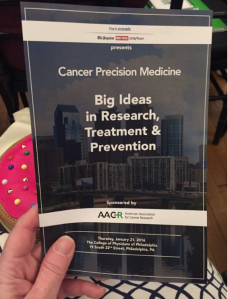 (AACR) and the Philadelphia Media Network. It was the first time that representatives from 6 Cancer Centers across Pennsylvania (Philly to Pittsburgh) were assembled in this fashion. It was a really cool thing because it represents a new frontier of collaboration toward cancer cures.
(AACR) and the Philadelphia Media Network. It was the first time that representatives from 6 Cancer Centers across Pennsylvania (Philly to Pittsburgh) were assembled in this fashion. It was a really cool thing because it represents a new frontier of collaboration toward cancer cures.
The first talk was by Dr. Stephen Grupp from Children’s Hospital of Philadelphia. He talked about what’s known as CAR T-cell cancer immunotherapy, a new approach to treating leukemia — where genetically modified immune cells are generating a response rate of 93% among kids with relapsed/refractory leukemia with no other viable treatment options. This type of response is UNPRECEDENTED in cancer. 93% response in heavily pretreated chemotherapy-resistant childhood leukemia, a population destined to die of their disease before this breakthrough — first documented in 2012 and since extended to 200 patients.
After some additional discussion of adult cancers, the meeting was opened up to questions. I jumped in as question número dos. It went something like this, not exactly but close: “I work in the adult cancer field as a contractor to the pharmaceutical industry but volunteer in the childhood cancer community, so I have several friends who have either lost children or whose children are dealing with the late effects of treatment. I know through my work that immunotherapy is moving to earlier lines of treatment much quicker in adults compared with kids. There are obvious reasons for this, including the fact that chemotherapy is not a good option for things like melanoma. And then there are ethical considerations in kids, because of the high response rates to chemotherapy. Chemotherapy may be effective but causes problems later in the form of late toxicity. Although we are not there yet, I was wondering if you could address the prospects for moving immunotherapy to earlier use in children. You mentioned in your talk the possibility of avoiding bone marrow transplants, but can you comment on the possibly of avoiding chemotherapy as well?”
Well, No, I’m not exactly short and to the point. Nonetheless, I grabbed the opportunity to remind the audience that children do still die from cancer while addressing the huge problem of late effects, which include secondary cancers and the need for things like liver and heart transplants later in life. Dr. Grupp already knows these things, but who knows about the rest of the attendees? My assumption was that most of the audience was in tune with adult but not childhood cancer. Late effects are more prominent in children.
The short answer from Dr. Grupp is that researchers are indeed looking to design trials to address the issues that I raised, including the use of immunotherapy before chemotherapy in certain high-risk patients unlikely to benefit from chemotherapy. That was good to hear. That’s a good next step. I know enough to know that if it works in the high-risk patients, testing in low-risk patients may be a logical next step. We are not there yet, key work “yet”. Chemo damages young bodies, we need to do away with it someday — key word “someday”. Again, not there “yet”, but all signs point to “someday”.
It was a large audience, 100s, mostly medical professionals. I had no idea how many childhood cancer parents and advocates were there, if any, when I stood to ask my question. There were over 20 questions from the audience over the course of the meeting, but mine was the only one specific to kids. My Question #2 was the first and only one specific to childhood cancer — how about that? I was glad that I took that opportunity to speak about kid-specific stuff.
 As I was walking out of the meeting, I spotted a very tall guy who stood out because he was so tall. But that face, so familiar. Then it was obvious — it was Devon Still of the NFL. His daughter Leah was treated at CHOP for a poor-prognosis cancer, and she’s currently in remission after a very public battle. Yay Leah! Her dad has been a very vocal advocate for not only her but also other kids; he has done a ton to raise awareness despite such tough days and keeping a busy work schedule. However, parents of kids who have been dealt the blow of childhood cancer should not have to shoulder that burden alone — it’s not fair. People like me, with healthy kids, can and should speak up too. It’s simply the right thing to do. Being a celebrity is not required.
As I was walking out of the meeting, I spotted a very tall guy who stood out because he was so tall. But that face, so familiar. Then it was obvious — it was Devon Still of the NFL. His daughter Leah was treated at CHOP for a poor-prognosis cancer, and she’s currently in remission after a very public battle. Yay Leah! Her dad has been a very vocal advocate for not only her but also other kids; he has done a ton to raise awareness despite such tough days and keeping a busy work schedule. However, parents of kids who have been dealt the blow of childhood cancer should not have to shoulder that burden alone — it’s not fair. People like me, with healthy kids, can and should speak up too. It’s simply the right thing to do. Being a celebrity is not required.
Of all the “Big Ideas” surrounding cancer, I personally think that replacing DNA-damaging chemotherapy and radiation in favor of cutting-edge novel therapies (immunotherapies, among others) is a HUGE one for the kiddos. It’s critical for all patients, but especially the kiddos because of the survivorship issues that stem from the late effects of toxic cancer treatments. Once again, we are not there “yet” — there is lots to learn first — but it is important to work hard today toward that “someday”, when cancer is routinely treated way more effectively AND safely. So I will continue to stand up and speak up, like I did today. I like to talk — I’m loud —I don’t care if I fumble or stumble — I don’t care about who does or does not like my questions — so might as well put those traits to good use!
Author: Laurie Orloski




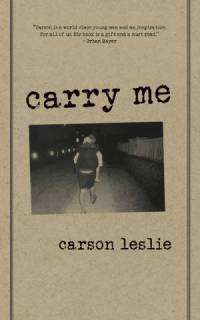


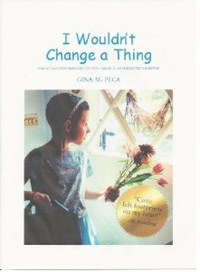
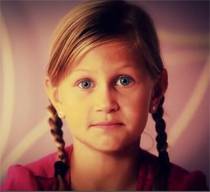

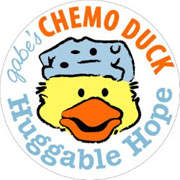



Great mission to base report for the advocacy community, Laurie. Thank you! We all hope these newer therapeutic approaches will deliver safer treatments. As you note, early indications are incredibly promising in terms of improving survival. But you are also spot on in your message that we must keep pressing and educating about the priority of taking proactive steps in research and clinical care to minimize risk of late effects as these new treatments are developed and evaluated. Key findings of the March 2015 Institute of Medicine workshop on Comprehensive Cancer Care for Children and Families emphasized opportunities for action to increase survival AND HIGH QUALITY OF LIFE, recognizing that emerging immunotherapy and more targeted “precision medicine” approaches still carry risks, though different from toxicities caused by traditional chemo and radiation. Taking action to build bipartisan Congressional support for the Childhood Cancer STAR Act (Survivorship, Treatment, Access, Research) S1883/HR3381 is a great way for the advocacy community to press these priorities forward as a unified voice as the “medical moonshot” conversations continue.
Hi Rebecca, thank you. I’ve sat in a lot of talks where the future of childhood cancer treatment is presented as the use of targeted therapies for relapsed/refractory disease. That is certainly a solid next step, but finding ways to test these new treatments as first-line therapy will be critical. It will be a challenge to researchers, in terms of designing the right trials with the right risk:benefit, but a challenge that can be overcome. At this same meeting, one of the panel members commented about how resilient kids are, how you can approach them aggressively. To someone who doesn’t know better, that makes childhood cancer treatment sound easy. That resilience, as we know, is only in the short-term … that mindset that kids are “so resilient” to chemo and RT–that you can really hit childhood cancer as hard as you need to–is a mindset that must change in the interest of public health. I agree completely on the need to support the STAR Act, it is something we can do right here and right now. The future is definitely looking up, as long as kids don’t continue to get lost in the shuffle when it comes to evaluating these new therapies, for which important questions do remain but for which the potential is so unprecedented.